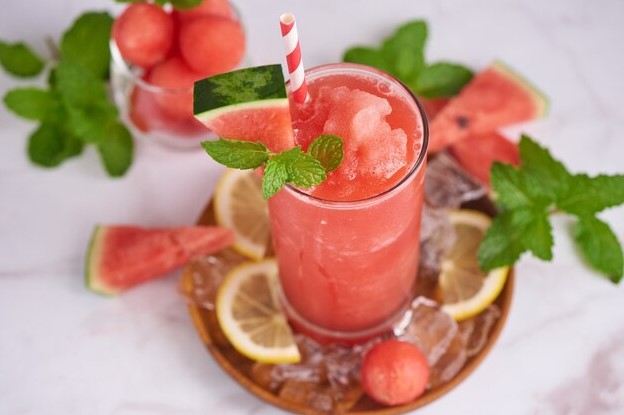Introduction to Strawberry Juice
Strawberry juice, with its vibrant red hue and sweet, refreshing taste, has been a beloved beverage for centuries. Originating from the gardens where strawberries were first cultivated, this juice has evolved from a seasonal delight to a year-round favorite. Its popularity soared as advancements in refrigeration and transportation made strawberries more accessible globally.
Nutritionally, strawberry juice is a powerhouse. It’s rich in vitamin C, a vital antioxidant for immune health and skin vitality. Additionally, it contains manganese, folate, and potassium, contributing to its heart-healthy and anti-inflammatory properties. The juice is also a source of dietary fiber, especially when made with whole strawberries, supporting digestive health.
This delightful drink not only tantalizes the taste buds but also offers a multitude of health benefits, making it a popular choice for health-conscious individuals and juice enthusiasts alike.
Benefits and Recipes
Health Benefits of Strawberry Juice
Strawberry juice is not just a delightful beverage; it’s a nutritional treasure trove that offers a range of health benefits. The primary components contributing to its healthfulness include:
- Vitamin C: This potent antioxidant is crucial for immune function and skin health. A single serving of strawberry juice can provide a significant portion of the daily recommended intake of vitamin C.
- Manganese and Potassium: These minerals are vital for bone health and maintaining healthy blood pressure levels.
- Folate: Especially important for pregnant women, folate aids in fetal development and can also contribute to heart health.
- Antioxidants and Phytochemicals: Strawberries are rich in compounds like flavonoids and phenolic acids, which reduce oxidative stress and may lower the risk of chronic diseases.
The impact of these nutrients on health is profound. Regular consumption of strawberry juice can contribute to heart health by reducing blood pressure and cholesterol levels. Its anti-inflammatory properties can alleviate arthritis symptoms and other inflammatory conditions. The antioxidants in strawberries can also aid in skin health, promoting collagen production and offering anti-aging benefits. For more detailed information on the health benefits, check out Healthline: Benefits of Strawberry Juice.
Delicious Strawberry Juice Recipes
Simple Homemade Recipes:
- Classic Strawberry Juice:
- Ingredients: 2 cups fresh strawberries, 1 cup water, 2 tablespoons honey or sugar (optional).
- Instructions: Blend strawberries with water until smooth. Strain the mixture to remove seeds (optional). Sweeten with honey or sugar if desired. Serve chilled.
- Strawberry Lemonade:
- Ingredients: 1 cup strawberry juice, 2 cups water, 1/4 cup lemon juice, 2 tablespoons sugar.
- Instructions: Mix strawberry juice, water, and lemon juice in a pitcher. Add sugar and stir until dissolved. Refrigerate until chilled. Serve with ice and lemon slices.
Creative Recipe Ideas:
- Strawberry Basil Cooler:
- Blend fresh strawberries with a handful of basil leaves, water, and a touch of honey. This unique combination offers a refreshing twist with an aromatic kick.
- Strawberry Ginger Zing:
- Juice fresh strawberries with a small piece of ginger root. Add a dash of lime juice for an invigorating drink that’s both spicy and refreshing.
These recipes showcase the versatility of this juice, making it a delightful addition to various beverages. Whether you prefer the classic taste or are adventurous with flavors, provides a perfect base for experimentation and enjoyment. For more creative recipes, visit Allrecipes: Strawberry Juice Recipes.
Strawberry Juice in World Cuisines
this juice has transcended beyond just being a refreshing drink, finding its way into various culinary traditions around the globe. Its versatility and universally appealing flavor have made it a favorite ingredient in diverse cultures.
In European cuisine, strawberry juice is often used as a base for delightful sauces and glazes, especially in French cooking. It’s paired with rich meats like duck, offering a sweet contrast to savory dishes. In Italy, it’s not uncommon to find the juice enhancing the flavor of delicate desserts, such as panna cotta or gelato, providing a fresh and fruity note.
Moving to the East, in Indian cuisine, strawberry juice is sometimes incorporated into lassi, a traditional yogurt-based drink, creating a fusion of tangy and sweet flavors. In Japanese cuisine, it’s used in crafting exquisite confections like strawberry daifuku, where the juice is mixed into the sweet red bean filling for a subtle fruity essence.
Popular dishes featuring strawberry juice include:
- Strawberry Balsamic Glaze: A reduction of strawberry juice with balsamic vinegar, often used as a dressing for salads or a drizzle over grilled meats.
- Strawberry Gazpacho: A refreshing, cold soup where strawberry juice is blended with tomatoes, peppers, and cucumbers for a sweet and savory summer dish.
- Strawberry Mousse: A light and airy dessert where the juice is combined with whipped cream and gelatin for a delicate, fruity flavor.
These examples illustrate how the juice has been creatively integrated into various cuisines, enhancing both savory and sweet dishes with its unique and beloved flavor. Explore more about fruit-based desserts in our article on Strawberry Ice Cream Cake, a delightful treat for all occasions.
Commercial Strawberry Juice
Buying Guide for Strawberry Juice
When purchasing store-bought strawberry juice, there are several factors to consider to ensure you’re getting a quality product:
- Ingredients: The best strawberry juices typically have minimal ingredients. Look for juices where strawberries are listed as the first ingredient. Avoid products with high fructose corn syrup or artificial flavorings.
- Sugar Content: Many commercial juices contain added sugars. Opt for juices labeled as “no added sugar” to enjoy the natural sweetness of strawberries.
- Organic Certification: If you prefer organic products, check for a certified organic label. This ensures the strawberries were grown without synthetic pesticides or fertilizers.
- Packaging: Choose juices in glass bottles or BPA-free packaging to avoid potential chemical leaching.
Some of the best brands known for their quality include Tropicana, Ocean Spray, and Simply Balanced. These brands often offer a range of the juice products, from pure juices to blends with other fruits.
Comparison: Fresh vs. Store-Bought
Comparing fresh and store-bought strawberry juice reveals differences in taste, nutritional value, and convenience:
- Taste: Fresh strawberry juice typically has a more vibrant and natural flavor profile. Store-bought versions might be sweeter and less nuanced in taste due to processing and added sugars.
- Nutritional Value: Freshly made the juice retains more vitamins and antioxidants since it hasn’t undergone pasteurization, a process that can reduce nutrient levels. However, some commercial juices are fortified with additional vitamins.
- Convenience: Store-bought juice offers unmatched convenience. It’s readily available, has a longer shelf life, and requires no preparation. Fresh juice, while more labor-intensive to make, offers freshness and the ability to control the ingredients fully.
Ultimately, the choice between fresh and store-bought depends on individual preferences and lifestyle. Those prioritizing taste and nutrition might prefer fresh juice, while those valuing convenience and shelf life may opt for commercial options.
Frequently Asked Questions
- Is strawberry juice good for weight loss?
- Yes, due to its high fiber content and low calories, the juice can be a great addition to weight loss diets.
- Can the juice improve skin health?
- Absolutely! The antioxidants in strawberries can help improve skin tone and texture.
- How long does homemade strawberry juice last?
- It’s best consumed within 1-2 days when stored in the refrigerator.
Advanced Topics
Strawberry Juice in Diet and Fitness
In the realm of diet and fitness, strawberry juice plays a significant role, particularly in weight loss and fitness-oriented diets. Its low-calorie profile, coupled with natural sweetness, makes it an excellent alternative to sugary drinks for those counting calories. The dietary fiber in strawberries, although less in juice form, can still contribute to a feeling of fullness, aiding in appetite control.
For fitness enthusiasts, strawberry juice is a favored choice due to its hydration capabilities and nutrient content. The potassium in the juice helps in muscle function and recovery, making it a popular post-workout drink. Additionally, the natural sugars present in the juice provide a quick source of energy, beneficial for those engaging in intense physical activities.
Incorporating this juice into smoothies with protein powder or blending it with other nutrient-rich fruits can create a balanced, healthful drink that supports fitness goals. Its versatility allows it to be a part of various dietary plans, catering to both weight loss and muscle-building regimes.
Scientific Research on Strawberry Juice
Recent scientific research has shed light on the numerous health benefits of strawberry juice. Studies have highlighted its role in reducing the risk of chronic diseases, primarily due to its high antioxidant content. These antioxidants, including flavonoids and phenolic acids, are known for their ability to combat oxidative stress and inflammation in the body.
One notable study published in the Journal of Agricultural and Food Chemistry found that regular consumption of strawberry juice could significantly reduce the markers of heart disease risk. The study pointed out that the juice improves lipid profiles and reduces LDL cholesterol (the “bad” cholesterol) levels.
Another area of research has focused on the neuroprotective effects of strawberries. A study in the Annals of Neurology suggested that the high levels of antioxidants in strawberries might help in delaying cognitive aging and protecting against neurodegenerative diseases.
Furthermore, research in the field of oncology has explored the potential cancer-fighting properties of strawberries. Researchers have observed that compounds in strawberry juice inhibit the growth of cancer cells in laboratory settings, opening avenues for future cancer prevention and treatment research.
These studies underscore the potential of this juice as more than just a tasty beverage, highlighting its role in promoting overall health and preventing various diseases.


